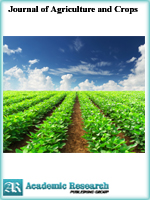Journal of Agriculture and Crops
Online ISSN: 2412-6381
Print ISSN: 2413-886X
Print ISSN: 2413-886X
Quarterly Published (4 Issues Per Year)

Archives
Volume 5 Number 1 January 2019
Impacts of Climate Change on Crop Production in Bangladesh: A Review
Authors: Md. Sazedur Rahman ; Md. Ashfikur Rahman
Pages: 6-14
DOI: doi.org/10.32861/jac.51.6.14
Abstract
Climate change and its impact on human-environment are immeasurable because of its multidimensional effects. But the effect is not same for all countries, it depends on the countries geographical settings. Alongside location, education of the people, environmental awareness, somewhat might minimize the probability of loss in response to any kinds of disasters. Undertaken study was conducted based on an extensive published literatures (197—between 1995 and 2018) review with a view to consolidating the possible impacts of climate change on crop production in Bangladesh. It has found that already the impact has begun badly in Bangladesh. Temperature is gradually rising, frequency of floods, river bank erosion, storm surge, magnitude of cyclone, salinity intrusion, and the volatility of rainfall has increased comparing to past. All these led to the probability of decreasing the crop production. As climate change has become a great concern for countries food security, it is now the appropriate time to take and install proper rules and regulations through inflexible attitude. With the help of various international and national organizations government of Bangladesh inordinately trying to reduce the consequences of climate change. A comprehensive measurement must make sure to enhance the capability of encountering climate change, otherwise it will cost of enormous loss, especially on agriculture in Bangladesh.
Effects of Adding Different Levels of Lactobacillus Inoculant to Alfalfa Silage Ensiled With Orange Pulp on In Vitro Gas Production and DM Digestibility
Authors: Maghsoud Besharati ; Mojtaba Karimi ; Akbar Taghizadeh
Pages: 1-5
DOI: doi.org/10.32861/jac.51.1.5
Abstract
This study was conducted to study the effects of supplementation alfalfa silage with orange pulp and difference of Lactobacillus buchneri on in vitro dry matter digestibility and gas production. wilted alfalfa with no additive (control), wilted Alfalfa and orange pulp (1750 g wilted Alfalfa mixed with 750 g fresh orange pulp) treated with LAB for final application rates of 0, 2.5, 5 and 7.5 g LAB inoculant/ton of wilted alfalfa and orange pulp (LAB0, LAB1, LAB2, LAB3, respectively). Alfalfa hay harvested at flowering stage and after 24 hours wilted and mixed orange pomace with ratio of 2100 g and 760 g, respectively, and was ensiled for 90 days. The data were analyzed in a completely randomized design with three replications. After 24 h incubation, treatments AO (alfalfa + orange pulp) and CON (without additive) had the highest and lowest in vitro gas production (p<0.05) and adding orange pulp and molasses increased gas production. Adding inoculant decreased in vitro DM digestibility. Results showed that ensiling alfalfa with orange pulp and molasses can improved silage quality and increased gas production and in vitro DM digestibility.



